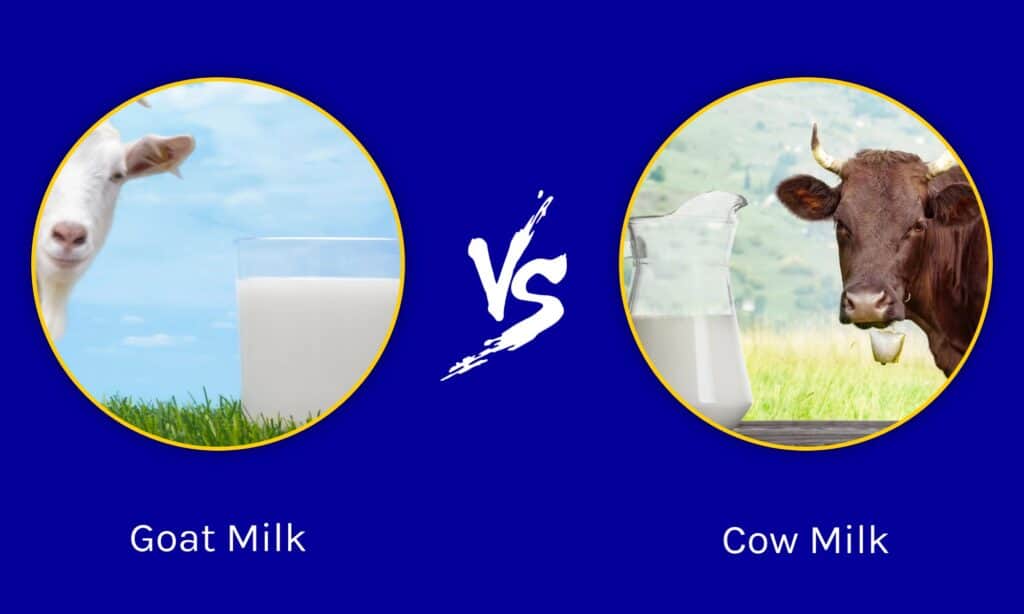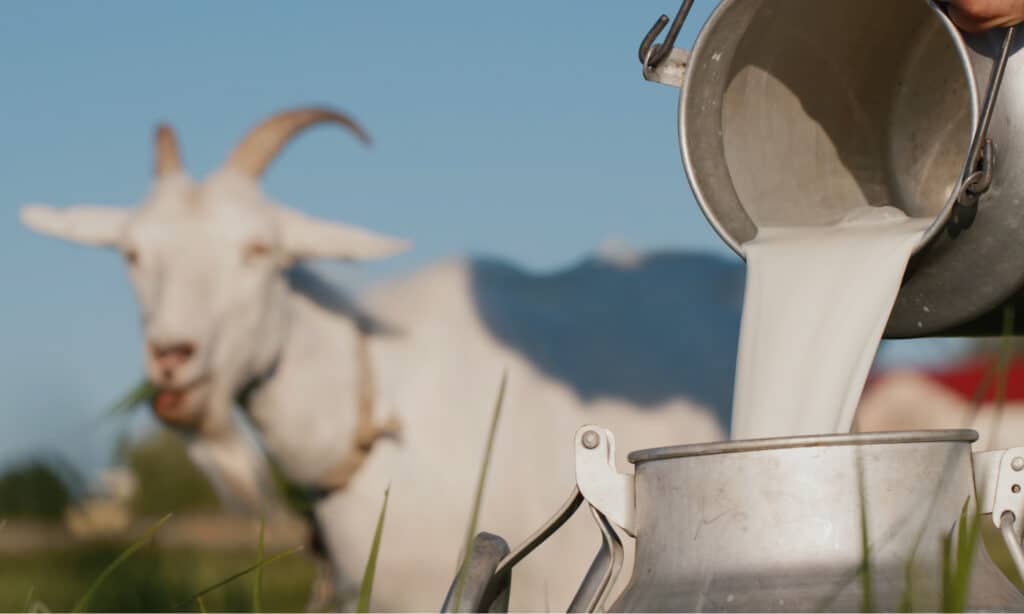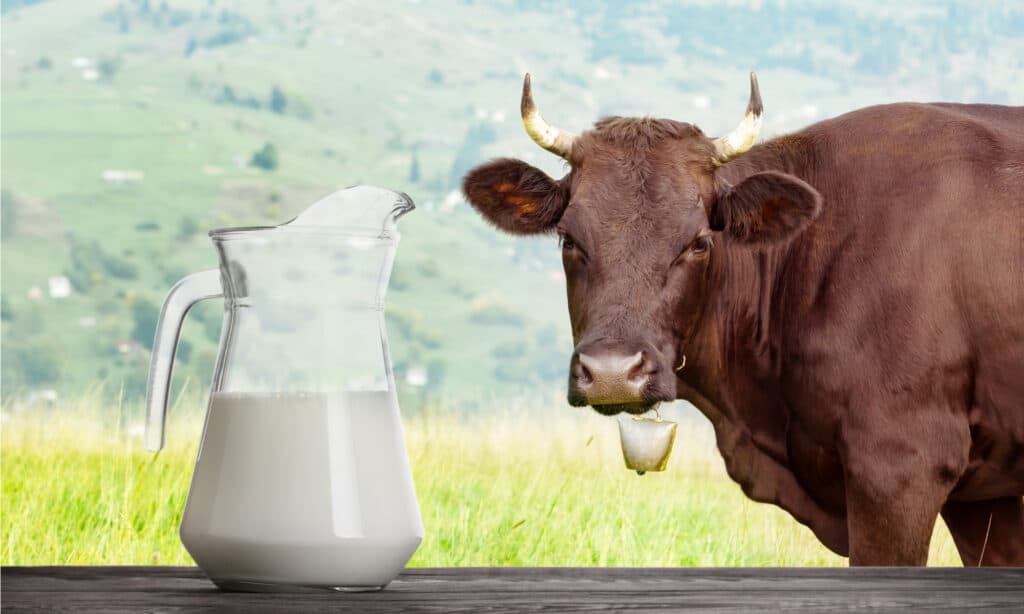We hear a lot these days about how cow milk may not be as good for us as we have been led to believe. But when comparing goat vs cow milk, which is better for you? One short answer is that goat’s milk contains more easily digested proteins that your body processes more easily. However, this is just the beginning of the differences between the two! We need to dig a lot deeper to see which really is the better option overall.
The Key Differences Between Goat Milk and Cow Milk

The key differences between goat milk and cow milk are the nutrition they provide and the common allergies and restrictions.
Let’s study these differences below!
Goat vs Cow Milk: Nutritional Comparison

Goat milk accounts for 65% of the world’s milk consumption, including its usage in infant pet milk for puppies.
©StockMediaSeller/Shutterstock.com
Cow milk is thought to be the standard for milk consumption, but the truth is that goat milk is the choice for 65% of the world’s population! This includes using goat milk as a substitution for infant pets like puppies that may need to be bottle-fed. We know that goat milk is easier to digest, but how does it stack up nutritionally? In the table below, we’ve got a side-by-side comparison of nine key factors for each:
| Goat’s Milk (8 Ounces) | Whole Cow’s Milk (8 Ounces) | |
|---|---|---|
| Calories | 170 | 150 |
| Protein (Grams) | 9 | 8 |
| Fat Content (Grams) | 10 | 8 |
| Carbs (Grams) | 11 | 12 |
| Lactose (Grams) | 11 | 12 |
| Calcium(mg) | 130 | 300 |
| Sugar (Grams) | 10 | 11 |
| Sodium (mg) | 122 | 120 |
| Potassium (mg) | 498 | 362 |
Though goat milk is higher in fat and has an overall higher fat content, it contains fewer carbohydrates and calcium. However, studies suggest that goat milk may enhance the body’s absorption of key nutrients. Nutrients like iron and copper may be absorbed in higher concentrations when goat milk is added to the meal.
Goat milk is lower in lactose, which may be better for individuals with lactose intolerance. It also contains a carbohydrate that helps provide nourishment to beneficial bacteria in the ecosystem of our digestive system.
However, the availability of goat milk and cow milk should also weigh into a choice between the two. Goat milk is harder to find commercially as it is often sold in raw form, which is banned in many areas. Cow milk is more commercialized and is often less expensive. In terms of use, both are often interchangeable. Goat milk and cow milk can be used equally in cooking, baking, and even ice cream!
Goat vs Cow Milk: Common Allergies and Restrictions

Cow milk is commercially pasteurized and is considered safer for some people.
©Alexlukin/Shutterstock.com
The most common restriction regarding milk from cows or goats is due to lactose intolerance. This intolerance is caused by what is called a Casein allergy. Cow milk contains A1 casein proteins, which many people find quite hard to digest. Goat milk contains A2 casein proteins, which many individuals find easier to digest. There are some cows that produce A2 milk, but that is more of an exception than a rule.
About Milk Products and Pasteurization
Milk derived from an animal needs to go through the pasteurization process to be safe to consume. Goat milk is often sold raw, and raw milk carries a serious risk of dangerous pathogens like salmonella or E. coli. Commercially sold cow milk goes through a rigorous FDA-mandated pasteurization process to remove the microorganisms that cause disease.
According to the Center for Disease Control (CDC), there were 127 outbreaks caused by raw milk products from 1993 to 2012. This caused a reported 1,909 illnesses and 144 hospitalizations. But not every foodborne illness is reported, and much more likely to occur.
Unpasteurized milk in any form is highly discouraged for those with weakened immune systems, such as transplant recipients, individuals with HIV/AIDS, diabetes, or cancer. Children and the elderly are also at risk. Pasteurization can be done at home but must follow strict food safety guidelines.
Is Goat Milk Better For You Than Cow Milk?
In some cases, goat milk can be a healthier and easier-to-digest option for many individuals. However, raw goat milk does not go through the food safety protocols recommended by the FDA and other food safety guidelines worldwide. At home, pasteurization is a necessary and time-consuming process. In contrast, cow milk goes through the process prior to purchase and is a more efficient and readily available option.
Whether goat milk or cow milk is the healthier option depends heavily on the individual. For some people, goat milk is better. For others, cow milk is the way to go. To wrap it up, the milk that is best for you is the one you should get!
Up Next:
The photo featured at the top of this post is © Ratthaphong Ekariyasap/Shutterstock.com
Thank you for reading! Have some feedback for us? Contact the AZ Animals editorial team.






